Related Research Articles
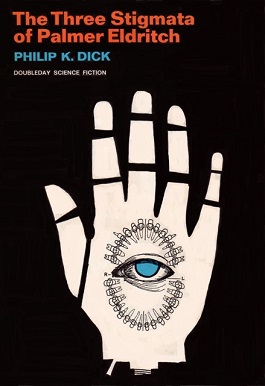
The Three Stigmata of Palmer Eldritch is a 1964 science fiction novel by American writer Philip K. Dick. It was nominated for the Nebula Award for Best Novel in 1965. Like many of Dick's novels, it utilizes an array of science fiction concepts and explores the ambiguous slippage between reality and unreality. It is one of Dick's first works to explore religious themes.

Poul William Anderson was an American fantasy and science fiction author who was active from the 1940s until his death in 2001. Anderson also wrote historical novels. His awards include seven Hugo Awards and three Nebula Awards.

"The Sentinel" is a science fiction short story by British author Arthur C. Clarke, written in 1948 and first published in 1951. Its plot and ideas influenced the development of the 1968 film 2001: A Space Odyssey and its corresponding novel.
Orphans of the Sky is a science fiction novel by American writer Robert A. Heinlein, consisting of two parts: "Universe" and its sequel, "Common Sense". The two novellas were first published together in book form in 1963. "Universe" was also published separately in 1951 as a 10¢ Dell paperback. The work presents one of the earliest fictional depictions of a generation ship.
"Faith of Our Fathers" is a science fiction short story by American writer Philip K. Dick, first published in the anthology Dangerous Visions (1967).

Dangerous Visions is an anthology of science fiction short stories edited by American writer Harlan Ellison and illustrated by Leo and Diane Dillon. It was published in 1967 and contained 33 stories, none of which had been previously published.
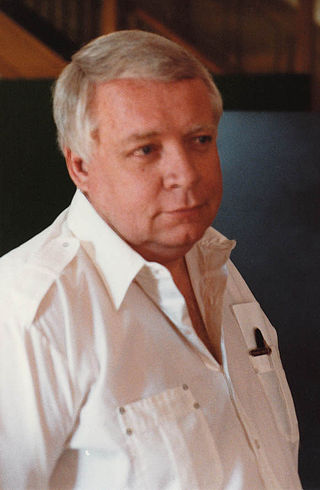
Algirdas Jonas "Algis" Budrys was a Lithuanian-American science fiction author, editor, and critic. He was also known under the pen names Frank Mason, Alger Rome, John A. Sentry, William Scarff, and Paul Janvier. He is known for the influential 1960 novel Rogue Moon.
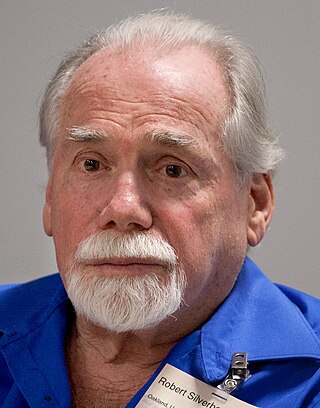
Robert Silverberg is an American author and editor, best known for writing science fiction. He is a multiple winner of both Hugo and Nebula Awards, a member of the Science Fiction and Fantasy Hall of Fame, and a Grand Master of SF. He has attended every Hugo Award ceremony since the inaugural event in 1953.

The Rest of the Robots is a collection of eight short stories and two full-length novels by American writer Isaac Asimov, published in 1964. The stories, centred on positronic robots, are all part of the Robot series, most of which take place in the Foundation universe. Another collection of short stories about robots, I, Robot, was re-published in the previous year, which is why Asimov chose to title the collection as The Rest of the Robots. None of the short stories in this collection were in I, Robot, however all of them were later included in The Complete Robot, and both novels about Elijah Baley were also published separately.
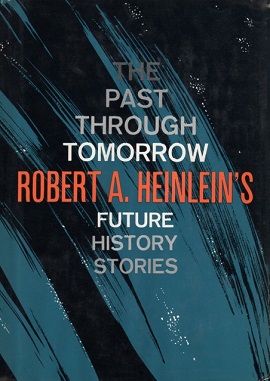
The Past Through Tomorrow is a collection of science fiction stories by American writer Robert A. Heinlein, first published in 1967, all part of his Future History.
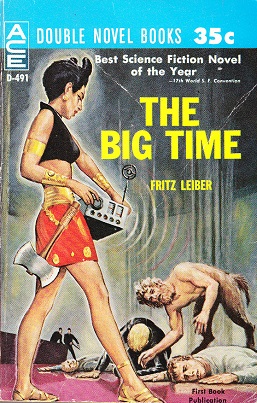
The Big Time (1958) is a short science fiction novel by American writer Fritz Leiber. Awarded the Hugo Award for Best Novelette during 1958, The Big Time was published originally in two parts in Galaxy Magazine's March and April 1958 issues, illustrated by Virgil Finlay. It was subsequently reprinted in book form several times. The Big Time is a story involving only a few characters, but with a vast, cosmic back story.

Time and Stars is a collection of science fiction short stories by American writer Poul Anderson, published in 1964.
The Golden Age of Science Fiction, often identified in the United States as the years 1938–1946, was a period in which a number of foundational works of science fiction literature appeared. In the history of science fiction, the Golden Age follows the "pulp era" of the 1920s and 1930s, and precedes New Wave science fiction of the 1960s and 1970s. The 1950s are, in this scheme, a transitional period. Robert Silverberg, who came of age in the 1950s, saw that decade as the true Golden Age. According to historian Adam Roberts, "the phrase Golden Age valorises a particular sort of writing: 'Hard SF', linear narratives, heroes solving problems or countering threats in a space-opera or technological-adventure idiom."
"The Jigsaw Man" is a science fiction short story by American writer Larry Niven, set in the Known Space universe. The story was first published in Harlan Ellison's anthology Dangerous Visions, and is included in Niven's collections All the Myriad Ways and Tales of Known Space.
"If All Men Were Brothers, Would You Let One Marry Your Sister?" is a science fiction short story by American writer Theodore Sturgeon. It first appeared in Harlan Ellison's anthology Dangerous Visions in 1967.
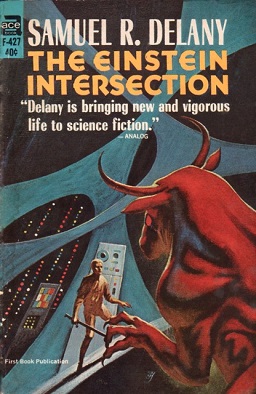
The Einstein Intersection is a 1967 science fiction novel by Samuel R. Delany. The title is a reference to Einstein's Theory of Relativity connecting to Kurt Gödel's Constructible universe, which is an analogy to science meeting philosophy. Delany's intended title for the book was A Fabulous, Formless Darkness.

Man of Earth is a science fiction novel by American writer Algis Budrys, first published in 1958 by Ballantine Books. "The Man from Earth", a "greatly different" earlier version of the story, was published in the debut issue of Satellite Science Fiction in 1956.
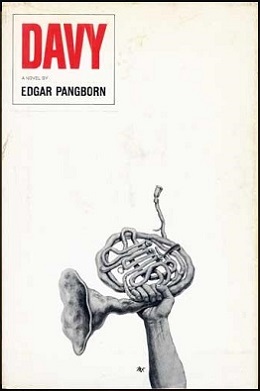
Davy is a post-apocalyptic science fiction novel by American writer Edgar Pangborn, nominated for the 1965 Hugo Award. It is set in the Northeastern United States some centuries after an atomic war ended high-technology civilization, with some scenes on an unnamed Atlantic island.

The Masks of Time is a science fiction novel by American author Robert Silverberg, first published in 1968. It was a nominee for the Nebula Award in 1968.

Nebula Award Stories Two is an anthology of science fiction short stories edited by Brian W. Aldiss and Harry Harrison. It was first published in hardcover by Doubleday in September 1967, with a Science Fiction Book Club edition following in November 1969. The first British edition was published by Gollancz in 1967, under the variant title Nebula Award Stories 1967. Paperback editions followed from Pocket Books in the U.S. in September 1968, and Panther in the U.K. in 1970. The Panther edition bore the variant title Nebula Award Stories 2. The book was more recently reissued by Stealth Press in hardcover in September 2001. It has also been published in German.
References
- ↑ Wagner, Thomas M. (1997). "SF Review: The Dark Between the Stars (1981)". SFReviews.net. Archived from the original on June 20, 2002.
- ↑ Budrys, Algis (April 1968). "Galaxy Bookshelf". Galaxy Science Fiction. pp. 155–163.